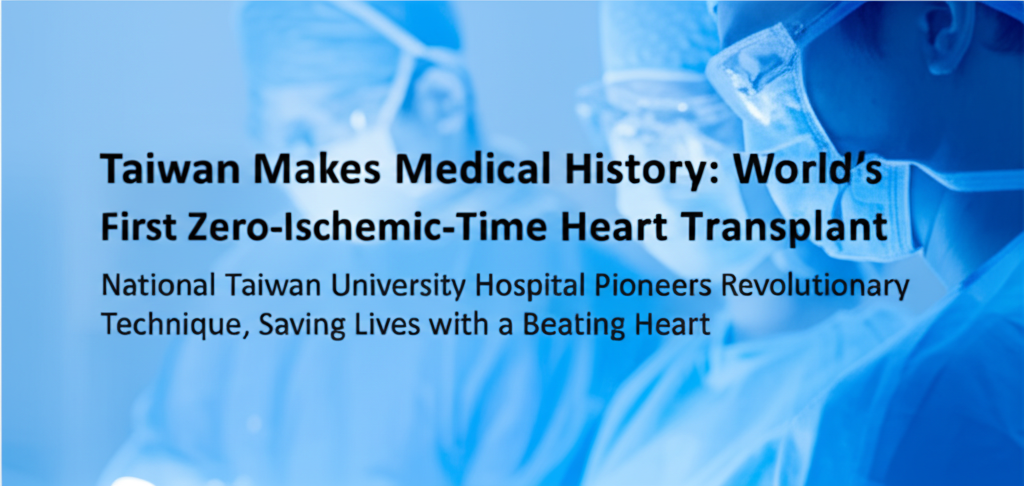Taiwan Makes Medical History: World's First Zero-Ischemic-Time Heart Transplant
National Taiwan University Hospital Pioneers Revolutionary Technique, Saving Lives with a Beating Heart

Taipei, Taiwan – In a groundbreaking achievement that could redefine the future of cardiac care, National Taiwan University Hospital (NTUH) has successfully performed the world's first heart transplant with zero ischemic time. This revolutionary procedure utilizes a novel system to keep the donor heart beating continuously, minimizing damage and improving outcomes for patients.
Traditionally, heart transplant surgeries involve a period of ischemic time, during which the donor heart stops beating after procurement. This can lead to injury and affect the success of the transplant. According to Chi Nai-hsin (紀乃新), an attending physician at NTUH's Cardiovascular Center, "We wanted to perform a heart transplant without any ischemic time so that the heart wouldn't have to stop, and we could also avoid injury [to heart tissue] that typically occurs after reperfusion."
The NTUH team, inspired by extracorporeal membrane oxygenation (ECMO), developed a mobile organ care system (OCS). This innovative system continuously perfuses the heart with oxygenated blood, preventing ischemia. This approach promises significantly better results, as shorter ischemic durations are associated with less myocardial damage, higher transplant success rates, and improved heart function.
The first successful surgery using the new OCS was performed in August on a 49-year-old female patient with dilated cardiomyopathy. In a compelling video shown at a news conference, the donor heart was seen beating continuously while being transported to the operating room. Following the transplant, the patient, surnamed Su (蘇), has resumed a normal life, with follow-up assessments showing excellent heart function. Chi highlighted her low levels of cardiac enzyme – an indicator of minimal heart muscle injury as a testament to the surgery's effectiveness.
Chi stated, "We have demonstrated the safety and feasibility of the surgery," noting the success of a second transplant earlier this year. The team hopes to apply this technique to more cases in the future, offering renewed hope to patients in need of heart transplants.
Su's case and the groundbreaking use of the OCS have been featured in the article, "First-in-human Zero-Ischemia-Time Beating-Heart Transplant," accepted for publication by the Journal of Thoracic and Cardiovascular Surgery Techniques. This achievement places Taiwan at the forefront of medical innovation.
While a team from Stanford University in the United States published research in March 2023 on "First Beating-Heart Transplant From a Donation after Cardiac Death Donor," the NTUH team's procedure differs significantly. Chen Yih-shurng (陳益祥), head of NTUH's Organ Transplant Team, explained that the Stanford team briefly stopped the heart, leading to a short ischemic period. In contrast, the NTUH team's procedures achieved zero ischemic time, with the donor hearts beating before, during, and after procurement.
